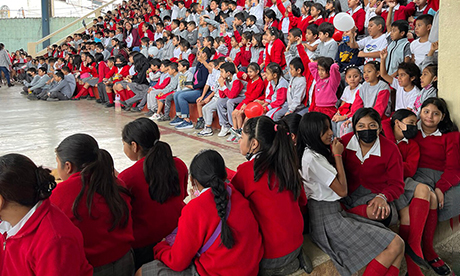Public schools in Guatemala are turning to Bible study programmes to tackle rising gang influence and enhance literacy. Despite initial hesitance from some educators, the programme is seeing positive change.
Terra Nueva, a tough neighbourhood in Guatemala City, faces challenges which include poverty and crime that stem from the nation’s troubled history.
To address the lack of educational resources and combat gang culture, schools have adopted initiatives like ‘Open the Book’, a programme by the Bible Society UK.
In Mixco, where resources are scarce, 650 students share just a dozen computers.
The introduction of ‘Open the Book’ has been met with enthusiasm, with students actively participating in dramatised Bible stories using singing and dancing as learning tools.
One 11 year-old student, Justin, expressed appreciation for how Bible stories contribute to his education. “Bible stories help me to be smarter and to learn about God” he said.
Initial reluctance
Despite initial reluctance, teachers like Evelyn Divas, head teacher at El Mezquital Public School, have seen the positive impact of incorporating Bible study into the curriculum.
Divas was the only practising Christian teacher in the school.
“I was worried they’d all think I was there just to impose my beliefs on them” she said. “At first, everyone was hesitant of the project and it’s hard for people to warm up to it.”
Divas says people have accepted it, and the children enjoy it.
Beyond educational benefits, the programme also serves as a support system for students grappling with violence.
Alison Estefinea Gutierrez, 11, shared how the lessons helped her cope with the loss of family members to gang violence. “Reading the Bible helped me forgive, and I’ve become less aggressive” Alison said.
Glimmer of hope
In a country plagued by crime and socio-economic challenges, Bible study initiatives like ‘Open the Book’ offer a glimmer of hope.
However, systemic issues persist, with poverty and corruption exacerbating the cycle of violence.
Newly elected President Bernardo Arévalo has pledged to prioritise education to uplift disadvantaged communities.
“For a long time, we have not invested in the same way to bring development to all communities in the country. The future of the children is at stake in the schools, and the future of the country is at stake in the children’s education” Arévalo stated.
However, addressing deep-rooted issues such as corruption and gang activity remains a formidable challenge.
Despite these obstacles, educators like Divas remain hopeful that programmes promoting positive values can make a lasting impact, nurturing a generation resilient to the lure of gang culture.
“I see this project as planting a seed … inviting them to live a life that is good. They may not even understand it right now, but I know they will someday.”
Sources
